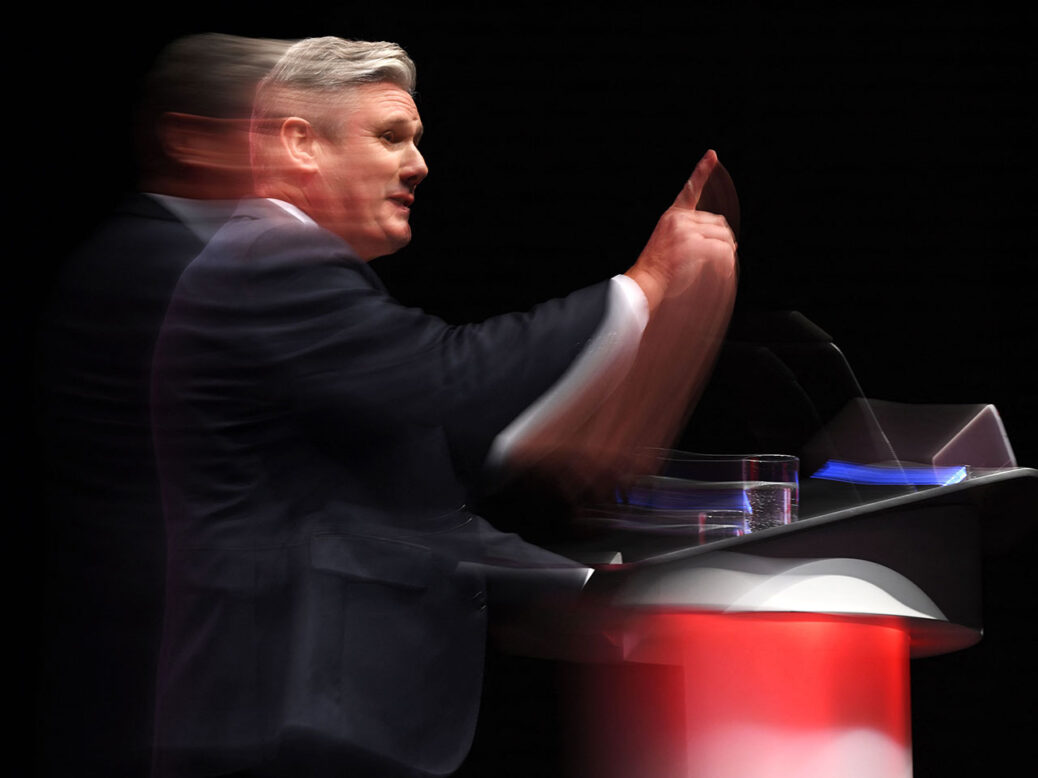
Rishi Sunak is probably doing one of two things right now: climbing the walls of Downing Street with frustration, or scrapping his “wedge issue” campaigns. Keir Starmer, on his mission to make politics boring again, is refusing to fight the battles the Prime Minister chooses, be it on immigration, trans rights or Brexit. The utter implosion of the Tories during “small boats week” shows the Labour leader’s strategy is working.
Stephen Kinnock, the shadow immigration minister, was supposed to be outraged at barges such as the Bibby Stockholm being used to house asylum seekers. He no doubt was – and not just because the desperate souls marched on to the vessel ended up being at risk of contracting Legionnaires’ disease. But, given the Conservative Party‘s deputy chairman had already admitted that the government’s policy on undocumented migrants was “a failure”, it made no sense for Kinnock to give Sunak something to aim at.
Instead of committing to end the use of barges immediately, which would have delighted both Labour‘s left and the struggling Tories, Kinnock accepted on Sky News this month that as prime minister, Starmer would have “no choice” but to temporarily keep the current infrastructure. Giving the government nothing to criticise meant the headlines were about government chaos – ten days of which culminated in the EU apparently ruling out a migrant returns deal with the UK – not Labour being soft on immigration.
This is how an opposition front bencher sounds when not malfunctioning. Of course, the left-wing group Momentum decried Kinnock’s words as “morally depraved”, but the government was deprived of the dividing line it craved. Downing Street wanted a bonfire. Labour brought a fire extinguisher.
See also: Labour’s refusal to commit to scrapping the two-child limit on benefits. Rachel Reeves, who may end up being the UK’s first female chancellor, could easily be granted Labour hero status should she step outside her self-imposed fiscal rules and vow to end the policy. But imagine the field day the Conservatives would have as a result.
[See also: Keir Starmer’s reshuffle was politically ruthless]
Labour’s strategy of presenting a small target makes it harder for the government to distinguish itself from the opposition. Starmer is prosecuting the case for a Labour government, and ministers defending 13 years of Tory rule are running out of ways to blame Tony Blair and Gordon Brown. It also means Jeremy Hunt, the Chancellor, cannot claim the opposition has pushed him into feared cuts to disability benefits or keeping the increasingly expensive triple lock on pensions, which in two years will cost more than education, policing and defence combined.
Starmer’s approach shows that he not only understands the public position on immigration and welfare (the former regularly ranks among the top five voter concerns, and polls show that, by a narrow margin, people support keeping the two-child limit), but also why Labour lost in 2015 and 2010, as well as in 2019 and 2017.
This strategy is not without its critics: many fear that without a more ambitious manifesto, Starmer will not have a mandate to transform the UK should he win power. But party insiders think this ignores the radical ideas Labour has already put forward, such as the pledge to spend £28bn a year on climate investment, plans to overhaul planning laws, or employment reforms that could lead to sector-wide fair pay agreements. They also see such critics as having a romanticised view of politics that argues Labour must win the hearts and minds of the whole nation, as Clement Attlee did in 1945, to achieve meaningful change.
Being a small target is creating space for Labour in the long term due to the pressure it puts on the Conservatives, but it carries short-term electoral risks. Stevenage Woman, the mythical suburban female voter struggling with the cost of living, who Labour aides see as key to election victory, for example, may find Reeves’s refusal to spend a tough sell. But the calculation for Labour seems to be that these are risks worth taking, considering the damage to Starmer’s reputation that changing course could invite and the ammunition it would give the Tories.
Margaret Thatcher secured victory in 1979 with a manifesto that had just five central promises. But it built on a wider Conservative effort to denigrate Labour’s record in office, which culminated in a vote of no confidence in James Callaghan. Similarly in 1997 Blair made the case for renewal, but only after ensuring John Major’s government could not recover from accusations of Tory sleaze and division over Europe. Both leaders went on to make an indelible mark on British life.
Labour’s 2024 election campaign will be built on a hard-headed attempt to destroy the Tories’ reputation. Any reckoning with the political philosophy of Starmer’s predecessors, it seems, will come only if he manages to reach power. The polls would suggest that, so far, this has proved effective and, if Labour can hold its nerve in the heat of an election campaign, may continue to be so.
[See also: Keir Starmer will bury Blairism]






